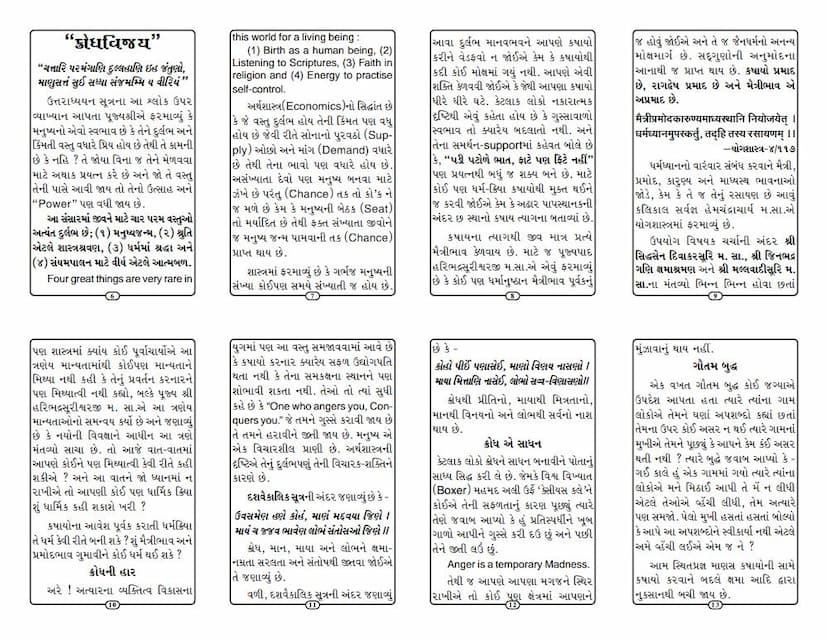Krodhvijay
Added to library: September 2, 2025

Summary
Here's a comprehensive summary of the Jain text "Krodhvijay" by Rajyashsuri, based on the provided pages:
The book "Krodhvijay" (Victory over Anger), authored by Rajyashsuri, is a discourse that emphasizes the profound importance of overcoming anger and other passions (kashayas) for spiritual progress and a meaningful human life. The text draws heavily from Jain scriptures and uses numerous examples and analogies to illustrate its points.
Key Themes and Arguments:
- Rarity and Value of Human Life: The book begins by quoting the Uttaradhyayan Sutra, highlighting the extreme rarity of four things for a living being: human birth, listening to scriptures, faith in religion, and the strength to practice self-control. Human birth is described as a unique opportunity, sought even by gods, due to the limited "seats" available. This rarity underscores the preciousness of this life and the need not to waste it on passions like anger.
- The Destructive Nature of Anger (Krodh): Anger is presented as a primary obstacle to spiritual progress and worldly success. It is described as a "temporary madness" that destroys love, makes one vulnerable, and leads to wrong decisions. The text quotes, "One who angers you, Conquers you," emphasizing how anger puts one in a state of defeat. Anger is also shown to be a root cause of many problems, leading to the destruction of virtue and prosperity.
- The Power of Equanimity and Forgiveness (Kshama): In direct contrast to anger, forgiveness is presented as the inherent nature of the soul and the key to overcoming negative emotions. The text emphasizes that while anger has detrimental effects on the body and mind, forgiveness offers relief. It is likened to returning home after going out, a natural and necessary state. The examples of Lord Parshvanath and Lord Mahavir subduing anger are cited as ultimate ideals.
- Practical Strategies for Overcoming Anger (Krodhvijay Tips): The book provides actionable advice for managing anger:
- Avoidance: Distance yourself from people or situations that trigger anger.
- Consideration: Address individuals when they are rested, not defeated or hungry. Similarly, avoid discussions when you yourself are in these states.
- Self-Reflection: Recognize anger as punishing oneself for another's mistake. It's unproductive to stress your own nervous system and lose vitality.
- Scriptural Emphasis: The importance of forgiveness is highlighted by its presence in scriptures like the Aavashyak Sutra, where monks are called "Kshama-shraman" (those who have mastered forgiveness).
- Health Benefits: Anger is said to impair digestion and memory, making avoidance beneficial for well-being.
- Beyond Anger: Other Passions (Man, Maya, Lobh): While anger is a primary focus, the book also touches upon pride (man), deceit (maya), and greed (lobh) as equally destructive passions that need to be overcome.
- The True Profit in Religion: The real profit in religious practices is the weakening of passions. A virtuous householder (shravak) becomes more generous, ethical, and forgiving, free from animosity and the desire for revenge.
- Consequences of Anger in This Life and the Next: The text illustrates the immediate and long-term consequences of anger. An example of a woman who immolated herself and killed her child due to anger due to a minor incident vividly portrays the destructive potential. It's also mentioned that even great ascetics can be reborn in lower forms (like snakes) due to unchecked anger.
- The Role of Gurus and Elders: The book emphasizes that gurus and elders are crucial guides in controlling the rising passions. Their guidance, sometimes through disciplinary measures (like a teacher hitting a disciple), helps curb the negative impulses. The example of Acharya Vijay Rajyashsuriji himself benefiting from such guidance highlights this point.
- The Importance of Humility and Detachment: True humility is not feigned but arises from an inner disposition. The text warns against the false pride of believing oneself to be free from anger.
- The Philosophy of Syadvada (Anekantavada): The concept of Syadvada is used to illustrate that there can be multiple valid perspectives on a situation. This understanding is crucial for tolerating differing views and avoiding conflict, thereby aiding in the conquest of passions.
- The Example of the Panch Parameshthis: The ultimate beings in Jainism, the Panch Parameshthis, are shown to exhibit immense humility and detachment, stating that their teachings are based on the wisdom of past Tirthankaras, not their own ego. This serves as an aspirational model for followers.
- The Goal of Nishkashayata (Freedom from Passions): The ultimate aim is to achieve a state of freedom from passions (nishkashayata), which leads to spiritual liberation (moksha). The text quotes, "Kashay Muktih Kil Mukti Dev" (Freedom from passions is indeed the divine liberation).
In essence, "Krodhvijay" is a guide to living a more virtuous and spiritually fulfilling life by understanding the detrimental impact of anger and other passions, and by actively cultivating qualities like forgiveness, humility, and detachment, with the ultimate goal of achieving spiritual liberation.